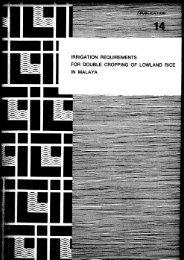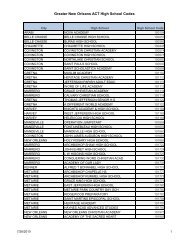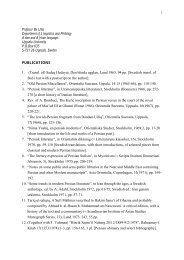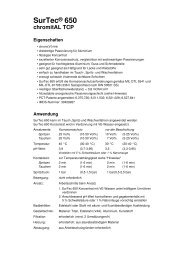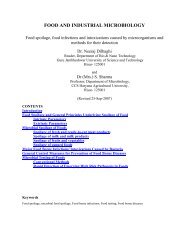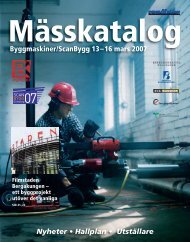On the Future of Indigenous Traditions - Munin
On the Future of Indigenous Traditions - Munin
On the Future of Indigenous Traditions - Munin
Create successful ePaper yourself
Turn your PDF publications into a flip-book with our unique Google optimized e-Paper software.
The munda is responsible to <strong>the</strong> manki who is <strong>the</strong> divisional incharge and also to <strong>the</strong><br />
administration <strong>of</strong> which he is functionary. The kili ‘punch’ is responsible to <strong>the</strong> kili<br />
itself. After <strong>the</strong> enforcement <strong>of</strong> Wilkinson Rule <strong>the</strong> munda and manki (which is a<br />
customary positions among <strong>the</strong> Hos) is recognized and nominated by <strong>the</strong> government<br />
from among <strong>the</strong> Khuntkattidar families, but <strong>the</strong> kili punch is elected by <strong>the</strong> people.<br />
Originally <strong>the</strong> munda was <strong>the</strong> custodian <strong>of</strong> <strong>the</strong> village land, but now he collects rents<br />
with <strong>the</strong> assistance <strong>of</strong> dakwa, and is responsible for keeping a check on crime in <strong>the</strong><br />
village, settles all disputes with <strong>the</strong> help <strong>of</strong> clan (kili) elders 43 and also does some <strong>of</strong><br />
<strong>the</strong> activities that a pahan among <strong>the</strong> Mundas does.<br />
The Kharias call <strong>the</strong>ir village head ‘Pradhan’. In some Kharia villages, <strong>the</strong> village<br />
panchayat is preceded by ‘Dihuri’, <strong>the</strong> village religious head. Besides <strong>the</strong> village<br />
panchayat, <strong>the</strong>y have an inter village federation or parha panchayat or ‘Kutumb<br />
Sabha’. If <strong>the</strong> parties in dispute are not satisfied with <strong>the</strong> decision <strong>of</strong> <strong>the</strong> village<br />
panchayat <strong>the</strong>y go to <strong>the</strong> inter village federation for justice. The post <strong>of</strong> <strong>the</strong> village<br />
head is hereditary. 44<br />
The Santhal village community is governed by a five member council headed by a<br />
‘manjhi’, <strong>the</strong> custodian <strong>of</strong> village property. The manjhis report to <strong>the</strong>ir ‘parganait’, <strong>the</strong><br />
head <strong>of</strong> <strong>the</strong> ‘pargana’ or group <strong>of</strong> villages. Next to <strong>the</strong> manjhi, <strong>the</strong> ‘paranik’ works<br />
more like his assistant or rent receiver. Then <strong>the</strong>re is ‘jogmanjhi’ who acts as ‘costos<br />
morum’ to <strong>the</strong> young people <strong>of</strong> <strong>the</strong> village. Anoher important post is <strong>the</strong> two <strong>of</strong>ficials<br />
‘naeke’ and <strong>the</strong> ‘kundam naeke’, <strong>the</strong> principal village priest and <strong>the</strong> field priest<br />
respectively. 45 Archer also noted that on occasion women could be appointed manjhis<br />
and that <strong>the</strong> post was usually hereditary. The highest body among <strong>the</strong> Santhals was<br />
<strong>the</strong> annual hunt where all adult males assembled. Underlying all <strong>the</strong>se structures was<br />
<strong>the</strong> notion that <strong>the</strong> community as a whole took decisions in every field- religious,<br />
political, social and economic, and that <strong>the</strong> headmen could be replaced if <strong>the</strong>y abused<br />
<strong>the</strong>ir position. 46<br />
43<br />
P.R.N.Roy, Hand Book <strong>of</strong> Chota Nagpur Tenancy Laws along with Customary Laws in Chota<br />
Nagpur (Allahabad:Rajpal and Company, 2005), 330.<br />
44<br />
Ibid., 334.<br />
45<br />
W.G. Archer, Tribal Law and Justice: A report on <strong>the</strong> Santhal (New Delhi: Concept Publishing<br />
Company, 1984), 4-10.<br />
46<br />
Nandini Sundar, “Custom' and 'Democracy' in Jharkhand”, Economic and Political Weekly 8<br />
(October,2005), 4430-4434.<br />
36





